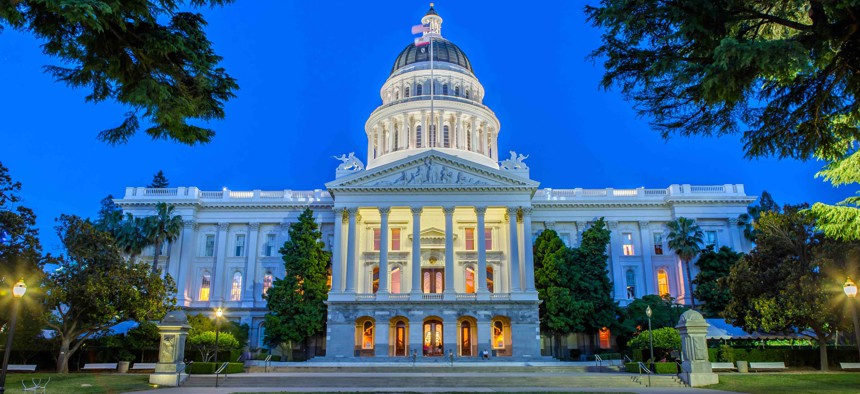In California, State Lawmakers Propose $100 Billion Stimulus Plan

The California state Capitol building in Sacramento. Shutterstock

Connecting state and local government leaders
The proposal calls for offsetting reduced federal unemployment benefits and a program to incentivize early tax payments.
Democratic state lawmakers in California are proposing a $100 billion package to boost the state’s economy amid the coronavirus outbreak, including backfilling potential reductions in federal unemployment benefit payments.
Instead of raising taxes, the proposal seeks to use existing revenue streams. It would also involve the state borrowing money. One component would offer taxpayers a discount to pay their taxes early—a possible boon to California's finances at a time when the virus is stifling a wide range of economic activity.
Many specifics about how different aspects of the plan might work were still sparse on Tuesday.
“Millions of Californians are suffering in this economic downturn, and Republicans in Washington, D.C. don’t seem to care,” Assembly Speaker Anthony Rendon said in a statement on Monday.
“I look forward to further development of today’s proposals and others in the weeks and months ahead,” he added.
Working groups in both the state Assembly and Senate developed the plan. Democrats say they want to press ahead with their proposals before the current legislative session adjourns on Aug. 31.
A three-page outline of the plan says it would aim to “fill gaps in unemployment insurance,” including extending benefits to undocumented workers and covering “shortfalls” that could result if federal lawmakers don’t extend a $600 a week unemployment benefit expiring this month.
Under the plan, California would borrow from the federal government to help pay for its unemployment program. The state has already done some borrowing like this during the course of the pandemic, as unemployment has hit historic highs. Last week, the California Employment Development Department said the state had paid out about $50 billion in unemployment benefits since March.
The $600 federal payment, enacted in March, comes on top of state unemployment insurance. Republicans in the U.S. Senate on Monday put forward a proposal that would lower the extra payment to $200 a week through September, and then shift to an arrangement where people would receive benefits based on a percentage of lost wages.
Democrats in Congress have proposed extending the $600 a week benefit through January of 2021.
The California plan would also authorize the state’s treasurer to issue “future tax vouchers,” which supporters say would generate billions of dollars to fund economic stimulus efforts.
In general, the voucher program would allow taxpayers to prepay their taxes and receive a small discount for doing so.
Mark Desio, a spokesman for Treasurer Fiona Ma’s office, declined to answer questions on Thursday about how the voucher program could work, referring an inquiry to Senate Majority Leader Robert Hertzberg’s office. Hertzberg’s office didn’t respond to a request for comment.
Other parts of the proposal seek to “securitize,” and “accelerate” the state’s spending of, a variety of revenues—including taxes and fees that fund highway projects, California Public Utilities Commission revenues, and money from the state’s cap-and-trade program.
The outline for the plan explains that the public utilities commission revenue would go towards expanding broadband internet service throughout the state.
A spokesperson for Assemblymember Phil Ting, one of the lawmakers who took a lead role in drafting the proposal, said the final details of the plan were still being worked out and that they couldn’t provide much more information than what was in the outline.
Another idea floated by the lawmakers would involve general borrowing, with the state turning to authorized, but unused, bond capacity to fund infrastructure projects. Exactly how much money could be made available this way is unclear.
The stimulus blueprint that the Democratic state lawmakers put forward calls for a variety of other measures as well, such as tax breaks for small businesses and sparing small businesses from covering the costs of increased unemployment benefit payments.
It also features proposed spending on programs meant to improve the environment and mitigate the effects of climate change. These initiatives would cover areas like wildfire prevention activities, waterworks upgrades and electric vehicle charging infrastructure.
Gov. Gavin Newsom declined to comment on the plan during a press conference on Monday, saying he hadn’t yet reviewed it.
In June, Newsom signed a $202 billion budget bill that addressed a $54.3 billion deficit. Republicans have criticized Democrats, who control both chambers of the legislature, for relying heavily on "gimmicks" and short-term fixes to balance the state’s budget.
California’s Senate Republican Caucus said in a statement that while some of the “broad strokes” of the Democratic stimulus plan may sound appealing, “the devil is always in the details.”
Bill Lucia is a senior reporter for Route Fifty and is based in Olympia, Washington.

NEXT STORY: Senate Republicans’ Relief Bill Scales Back Enhanced Unemployment Benefits





